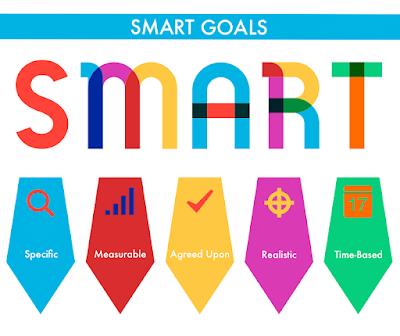Managing diabetes involves setting achievable goals that can guide you in maintaining healthy blood sugar levels and overall well-being. The SMART goals framework—Specific, Measurable, Achievable, Relevant, and Time-bound—provides a structured approach to setting effective goals.
Here’s a detailed guide on how to apply SMART goals to diabetes management.
1. Specific Goals
Specific goals clearly define what you want to achieve. They focus on a particular aspect of diabetes management.
Example:
- Non-specific goal: "I want to eat healthier."
- Specific goal: "I will eat at least five servings of fruits and vegetables each day."
Why it matters: Specific goals provide clear direction and purpose, making it easier to understand what actions you need to take.
2. Measurable Goals
Measurable goals include criteria for tracking progress and determining success.
Example:
- Non-measurable goal: "I will exercise more."
- Measurable goal: "I will walk for 30 minutes, five days a week."
Why it matters: Measurable goals allow you to track your progress and stay motivated by seeing your achievements.
3. Achievable Goals
Achievable goals are realistic and attainable, considering your current circumstances and resources.
Example:
- Unachievable goal: "I will run a marathon next month."
- Achievable goal: "I will start by walking 30 minutes a day and gradually increase to running over the next six months."
Why it matters: Achievable goals ensure that you set yourself up for success rather than frustration and disappointment.
4. Relevant Goals
Relevant goals align with your overall diabetes management plan and personal health needs.
Example:
- Irrelevant goal: "I will learn to play the guitar."
- Relevant goal: "I will monitor my blood sugar levels before and after meals to understand how different foods affect my levels."
Why it matters: Relevant goals ensure that your efforts are directed toward areas that will have a meaningful impact on your diabetes management.
5. Time-bound Goals
Time-bound goals have a specific timeframe for completion, creating a sense of urgency and helping to prioritize tasks.
Example:
- Non-time-bound goal: "I want to improve my blood sugar levels."
- Time-bound goal: "I will reduce my A1C level by 0.5% within the next three months by following my meal plan and exercising regularly."
Why it matters: Time-bound goals help you stay focused and motivated, providing a clear deadline to work towards.
Detailed Examples of SMART Goals for Diabetes Management
Goal for Blood Sugar Monitoring:
- Specific: I will test my blood sugar levels four times a day (before meals and at bedtime).
- Measurable: I will record my blood sugar levels in a logbook or app.
- Achievable: I have the testing supplies and knowledge to do this.
- Relevant: Regular monitoring helps me understand my blood sugar patterns.
- Time-bound: I will start this habit for the next month and then review my progress with my healthcare provider.
Goal for Diet:
- Specific: I will limit my intake of sugary beverages.
- Measurable: I will drink no more than one sugary beverage per week.
- Achievable: I can replace sugary drinks with water, herbal tea, or diet drinks.
- Relevant: Reducing sugar intake helps control my blood sugar levels.
- Time-bound: I will maintain this habit for the next three months and then reassess.
Goal for Physical Activity:
- Specific: I will increase my physical activity by incorporating walking into my daily routine.
- Measurable: I will walk for 30 minutes, five days a week.
- Achievable: I can walk during my lunch break or in the evening.
- Relevant: Regular exercise helps lower blood sugar and improve overall health.
- Time-bound: I will follow this plan for the next six weeks and then evaluate my progress.
Goal for Medication Adherence:
- Specific: I will take my diabetes medications as prescribed.
- Measurable: I will use a pill organizer and set reminders on my phone.
- Achievable: I have access to my medications and can set up reminders easily.
- Relevant: Taking medications as prescribed helps control my blood sugar levels.
- Time-bound: I will track my adherence for the next month and discuss any challenges with my healthcare provider.
Additional Strategies for Setting and Achieving SMART Goals
1. Break Down Larger Goals:
- If your goal feels too overwhelming, break it down into smaller, more manageable steps. For example, if your goal is to lose 10 pounds, you might break it down into losing 1-2 pounds per week.
2. Create a Support System:
- Share your goals with family, friends, or a support group. Having a support system can provide encouragement and accountability.
3. Use Technology:
- Utilize apps and devices to help you track your progress. Many apps can track your food intake, physical activity, and blood sugar levels, providing you with valuable insights.
4. Reward Yourself:
- Set up a reward system for achieving your goals. For example, if you meet your exercise goal for the month, treat yourself to a non-food reward, such as a movie night or a new book.
5. Review and Adjust:
- Regularly review your goals and progress. If you’re not meeting your goals, consider adjusting them to be more realistic or changing your approach.
Conclusion
Setting SMART goals for diabetes management provides a structured and effective way to achieve better health outcomes. By being specific, measurable, achievable, relevant, and time-bound, you can set realistic goals that support your overall diabetes care.
Regularly reviewing and adjusting your goals ensures they remain aligned with your needs and progress, helping you stay on track and achieve better diabetes management outcomes.
Join Our Diabetes Support Community on WhatsApp!
Living with diabetes can present daily challenges, but you don't have to navigate this journey alone. Join our supportive WhatsApp channel for valuable resources, expert advice to help you manage your diabetes effectively!
Why Join?
Stay Informed: Get the latest updates on diabetes management, treatment breakthroughs, and lifestyle tips.
Join Now! Click the link below to join our diabetes support community and take control of your health:

0 Comments
Post a Comment
Share your views